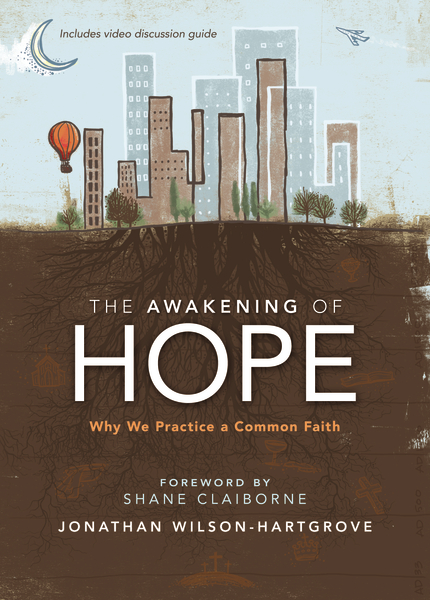With all this talk of camping and the outdoors, I may be losing some of my theology-nerd street cred. So maybe it is time to dive back into some thoughtful reading. Today’s post isn’t quite full-on over the top boring academic theology; we should probably ease our way back into this.
Over a year ago, I had the pleasure of reading Jonathan Wilson-Hartgrove’s The Wisdom of Stability. I not only love what he had to say, but how he said it. So when Alison told me that he had written a new book, I couldn’t wait to dive in. His new book is called The Awakening of Hope:Why We Practice a Common Faith.
As I expected, this new book is filled with poignant reflections on the Christian life – particularly as it is lived in community. This doesn’t come as a surprise, largely because so much of what Wilson-Hartgrove draws from is his own experiences in the Rutba House, a new monastic community in Durham, North Carolina.
The table of contents gives a good sense of what one might expect in picking it up…
- Pictures of Hope
- Why We Eat Together
- Why We Fast
- Why We Make Promises
- Why It Matters Where We Live
- Why We Live Together
- Why We Would Rather Die Than Kill
- Why We Share Good News
I’m only about halfway through, but he has already given me lots to think about. Each of the topics he addresses are things that I’ve previously encountered and spent some time reflecting on, but he comes at them in ways that I haven’t really considered before. Or I guess maybe a better way to say it is that we share a similar view or opinion, but the way he expresses is how I wished that I had.
Some great thoughts here on infidelity and trust…
Infidelity is a tendency deep within us. But it also comes to us through the constant barrage of powers at work in this world’s broken systems. Because sex sells we are inundated daily by the suggestive poses of women and men to whom we’re not only not committed but whom we do not even know. Their images come to our senses not as icons in which we might glimpse the divine but as products to be consumed. This pornographic imagination is extended to real estate, destinations, entertainment events, and even educational opportunities. Our broken economy does not invite us to ask how we might be faithful to our people and place but rather how we might use them to satisfy our base desires. Infidelity is sold to us as a good … To make promises is to proclaim that a culture of mistrust has been interrupted by One whom we can trust. It is to live as a sign of God’s faithfulness, even as we struggle to grow into fidelity ourselves. We make promises because we’ve glimpsed a picture of hope and know that it points us toward the life we were made for.
I’ve probably re-read this paragraph a dozen times and it is no less convicting the twelfth time through as the first. If the second half of the book is as thought-provoking and spirit-stirring as the first, I may need to take a breather before forging ahead.
Anyone out there reading anything great right now?


